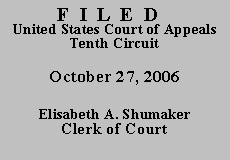

| KEITH ALLEN MILLER, |
|
| v. | |
| ERIC FRANKLIN,
Respondent - Appellee. |
|
Before HENRY, BRISCOE, and O'BRIEN, Circuit Judges.
I. BACKGROUND
Mr. Miller was convicted of first-degree murder and possession of a sawed-off shotgun. He received concurrent sentences of life imprisonment and two years' imprisonment, respectively. On January 9, 2004, the Oklahoma Court of Criminal Appeals ("OCCA") affirmed his conviction. Mr. Miller did not seek certiorari review at the United States Supreme Court.
On March 29, 2005, Mr. Miller filed an application for state post-conviction relief, which was stricken on June 1, 2005, for failure to comply with the court's rules regarding excess pages. Mr. Miller filed a second application on July 7, 2005, which was denied on October 25, 2005. Mr. Miller appealed, and the OCCA affirmed the denial on January 12, 2006. Mr. Miller filed a petition pursuant to § 2254 in the federal district court on January 30, 2006; there was no certificate of mailing but the Declaration under the Penalty of Perjury was dated January 25, 2006. The magistrate judge recommended (1) dismissal of Mr. Miller's first eight contentions as untimely and (2) rejection of his ninth contention on the merits. The district court adopted the magistrate judge's report and recommendation and dismissed the petition. The district court then denied Mr. Miller a COA, and this request followed.
II. DISCUSSION
A COA can only issue "if the applicant has made a substantial showing of the denial of a constitutional right." 28 U.S.C. § 2253(c)(2). "A petitioner satisfies this standard by demonstrating that jurists of reason could disagree with the district court's resolution of his constitutional claims or that jurists could conclude the issues presented are adequate to deserve encouragement to proceed further." Miller-El v. Cockrell, 537 U.S. 322, 327 (2003). When a district court has dismissed a habeas petition on procedural grounds, a certificate will only issue when "jurists of reason would find it debatable whether the district court was correct in its procedural ruling." Slack v. McDaniel, 529 U.S. 473, 484 (2000).
Under 28 U.S.C. § 2244(d)(1), "[a] 1-year period of limitation shall apply to an application for a writ of habeas corpus by a person in custody pursuant to the judgment of a State court." 28 U.S.C. § 2244(d)(1). Mr. Miller's conviction became final for purposes of 28 U.S.C. § 2244(d)(1)(A) on April 8, 2004, when the ninety-day period to file a certiorari petition in the United States Supreme Court expired. Therefore, to be timely, Mr. Miller had until April 9, 2005, unless this period was tolled, to file his habeas petition. Id. § 2244(d)(2); United States v. Hurst, 322 F.3d 1256, 1261 (10th Cir. 2003) ("Because [petitioner] did not seek Supreme Court review, the one-year period of limitations applicable to his § 2255 motion commenced on the day after expiration of the time for petitioning for certiorari.").
Mr. Miller raises contentions (1) through (8) before this court, and also challenges the district court's conclusion that his petition was untimely. The magistrate judge reasoned that because Mr. Miller's first post-conviction petition was not properly filed, he was not entitled to tolling for this application. See Burger v. Scott, 317 F.3d 1133, 1139 (10th Cir. 2003) ("[A]n application is 'properly filed' when its delivery and acceptance are in compliance with the applicable laws and riles governing filings."). "[S]tate procedural law must govern when determining whether a state petition is 'properly filed' . . . ." Adams v. LeMaster, 223 F.3d 1177, 1181 (10th Cir. 2000).
The magistrate judge also concluded that Mr. Miller was not entitled to statutory tolling for his second post-conviction application filed on July 7, 2005 because it was not commenced until after the limitations period had already expired on April 9, 2005.(*) Rec. doc. 5, at 7 (Magistrate's Recommendation and Report, filed Feb. 3, 2006). The magistrate judge also concluded that, even if Mr. Miller's first state post-conviction application had been properly filed, his § 2254 petition would have been due no later than January 17, 2006. Id. at 8, n.5. Because the earliest date that the petition was filed was January 25, 2006, his petition was at least seven days late. The magistrate judge also noted that Mr. Miller did not present any exceptional circumstances that might warrant equitable tolling. Id. at 8-9.
Based on our review of the record on appeal, the district court's order, and Mr. Miller's submissions to this court, we are not persuaded jurists of reason would disagree with the district court's disposition of Mr. Miller's § 2254 petition. In sum, reasonable jurists would agree with the district court that Mr. Miller's case does not present "rare and exceptional circumstances" warranting equitable tolling under 28 U.S.C. § 2244(d). Gibson v. Klinger, 232 F.3d 799, 808 (10th Cir. 2000) (internal quotation marks omitted). Accordingly, we DENY Mr. Miller's request for a COA, DENY his motion to proceed IFP, and DISMISS the matter.
Entered for the Court,
Robert H. Henry
Circuit Judge
*. We note that the magistrate judge determined the limitations period expired on April 8, 2005, but that this miscalculation does not change the result.